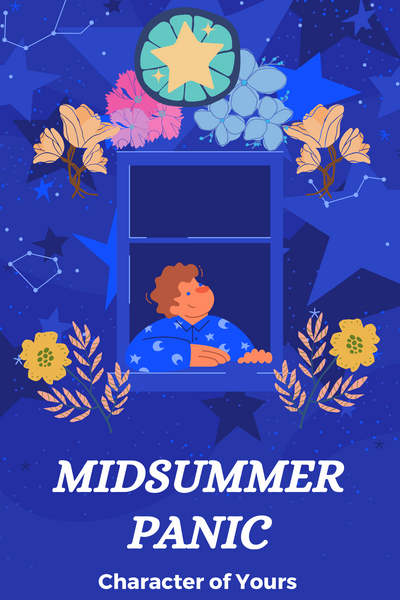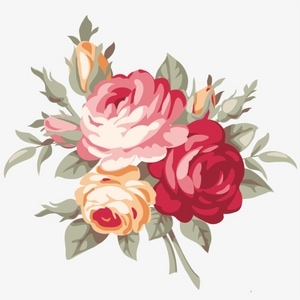Slowly and steadily, their steed climbed up the mountain pass. The nomad watched as the familiar grassy plains of the valley suddenly ended at the base of the mountain’s steep, dark cliffs. The arid stench of the mountain, like rust and burnt wood, was a blunt reminder of what life at its top used to be like.
They’d known how isolated the mountain was from the rest of the world, but it didn’t hit them how long that journey was until they were passing through a ceiling of clouds. They saw then that the path stretched endlessly ahead, and they were no closer to the top. The air was colder and thinner there too, so that the nomad felt ice slowly creeping up on their bones. The mule had to rest frequently. But that didn’t mean they would stop.
At one point, they thought they caught a whiff of an unfamiliar scent on the wind. Tulips, lilacs, and oven-baked cookies. They narrowed their eyes and pushed forward.
When they’d left the mountain thirty years prior, it was a scarred and barren wasteland. But, an area at the top had this miraculous quality where it was like a bubble of warm, oxygen-rich air, even back then. There must have been a whole forest up there at one point, but then a huge section of its nature had been burned away. And the nomad tried to bring peace to the mountain, to give it back it’s life, but plants would not grow and animals would not stay.
They were shocked when they passed through another layer of clouds and a warm, humid breeze swept over their face. When they saw what had become of their old home, they couldn’t help but smile with wonder.
The ground was covered with a thick layer of rich green grass, with unassuming little wildflowers poking out between the blades. The old trees, which had been blackened from fire, were now replaced with adolescent ponderosa pines. Among them were rows of tulips and lilacs and other species the nomad could not name, all growing along small artificial rivers that ran the length of the garden. The nomad grinned as they beheld the miraculous recovery of their old home.
Well, it wasn’t miraculous, but purposeful regeneration. Someone had devoted years of their life to regrowing a small piece of land, and that someone must have been the one baking cookies in their cottage.
The nomad tied their mule to a tree so he could drink from a small pond at the edge of the utopia, away from the flowers. Then they knocked on the door, which was surrounded by a neatly pruned bed of yellow and pale purple alpine flowers, and the remains of a burnt fence post. Seeing that, the nomad grimaced.
The woman, who must have been in her fifties, looked shocked when she opened the door. She was stocky, wearing a heavy jumper despite the warm climate, and her sleeves and pant legs were dirty from yard work. She had brown skin, cold dark eyes surrounded by bags and harsh lines, and a massive cross on her forehead, which contorted when she saw the nomad.
“Hello,” they smiled, bowing to the woman. They gave her their name.
“Hello,” she said, stiffly. Her voice cracked like she hadn’t spoken in years.
“Sorry to visit like this, but I used to live on this mountain, and I came back here to check on the place.” They bowed again, out of respect for the woman who’d brought the whole area back from the dead. “Oh, and my mule is here too. I made sure he’s away from the flowers.”
The woman waved vaguely at the world she’d built. “Yes, as you can see, it’s intact. I’m not leaving, if that’s what you want. I live here now.”
“No, no. I don’t mean that! You have treated this place with more kindness than I could ever have. I just wanted to ask if you knew about the secret stash?”
She raised an eyebrow.
“I only want one thing from it, and you can keep the rest,” they winked. The woman stepped out of the way, and they walked past, bowing their head once again.
When they’d lived there, the only furniture in the cottage was their bedroll and a rocking chair. But the house now contained one chair, table, rug, oven, and stove. They wondered if she was using their old reading room as a bedroom, but couldn’t see it since her door was closed.
“Ahah, the rocking chair,” they said, lifting the chair and putting it aside. “I’ll have to move this.”
Underneath the rocking chair’s old spot, there was a stone panel stubbornly wedged in the floor. The woman helped them take it out, and after a few tries, they wrenched the panel from the ground. Beneath it was a pile of books.
“Oh,” said the woman, sounding a bit disappointed.
The nomad’s eyes lit up and they pulled out the small stack of books, tied together with an aged and crumbling piece of string. “Ah! I missed these books. I always regretted not bringing them with me when I left.”
They found The Jester’s Most Subpar Jokes, and pulled it open to a random page.
“How do you know if flowers have a mouth? It's because they have Tu-lips!”
Perfect. It was exactly what they needed for their journey. They showed her the book. “This is all I needed. If you want reading material, you can have the rest.”
They were delighted to find that her eyes had lost their coldness. Instead, they were filled with vague concern. After taking the remaining books, she asked them, “What was your name again?”
They repeated their name. “And you never told me yours.”
“You may call me Glass.”
“Do you mind if I stay a little longer, then, Glass? To explore this place and rest before heading back down the mountain?”
She nodded, looking over the books in her arms. “Okay, if you wish, you can stay.”
“Are . . . you baking cookies?”
She nodded. “We shall share cookies and tea.”
While they were waiting for the cookies to finish baking, Glass took them out to gather tea leaves and they introduced her to their mule. He licked her hand and snorted happily.
Then the two of them sat down in the garden with cookies and tea and spoke to each other about the last thirty years.
She said she’d journeyed to the mountain with only a few supplies, including seeds for produce and flowers, and found a small area on the top of the mountain that was beginning to recover from a wildfire. She stayed, journeying down the mountain and receiving travellers on occasion until she had quite literally grown a life for herself.
“You have truly done wonders for this place, I can’t imagine the dedication it must have taken,” the nomad said, biting into a sugar cookie. “Ever since I left here, I have been travelling all over the world.”
And now their smile widened, because they realized they could talk about their treasures. They wore a bison-helmet, with long metal horns sticking out of its sides. It must have looked so strange to her, but they explained that they’d traded for it in the north. It was a souvenir of their time spent with a friend of theirs up there. Granted, they might never see that friend again. Besides that, they wore a necklace of shells around their neck, gifted to them by a child in a seaside village towards the south. They marvelled every day at how such delicate things could remain intact as long as they have, and that was one of its many beauties. They also had a flower pendant attached to a scarf around their waist, which they’d bought at a market a few years prior.
But while they told their stories, they lost their smile for a moment. Each souvenir suddenly seemed so trite. They stayed in each place for a bit of time and then left it behind forever. How were souvenirs supposed to represent all of those people? All that music and life?
There was a sudden quiet, which Glass tried to dispel.
“The flower,” the woman said, with an awkward smile. “Do you enjoy them?”
“Oh no,” they shook their head. “I mean I do enjoy them, but I have a black thumb.”
She nodded, looking disappointed.
“I’m willing to grow a green one, though,” they said, hurriedly. She smiled.
She gave them a tour of the garden, leading them past her fenced produce, the bird houses hanging from the trees, her compost bin. Looking at all that life, all the love she must have poured into her isolated world, the nomad wished, for a very short moment, that they could stay there forever. They wouldn’t, of course, stay forever, but it was a thought. One that made their pulse rushed and their movements erratic.
The nomad spent a week there, doing odd jobs and enjoying the sweet smelling air, before Glass finally told them how she ended up on that mountain.
They were pulling weeds out of the garden together (How did weeds get up there? Only the spirits knew), and the visitor was sweating considerably despite the chilly evening air. They kept stealing glances at the mountain’s surroundings, at how the sky was infinite and clear, stretching over hundreds of miles of rainbow clouds, as soft and lavish as a queen’s bedroom. The sun was a half-lidded eye, reclining slowly beneath the horizon to get proper rest.
Glass followed their gaze.
They were both still.
She said, “Do you want to know how I ended up here?”
They nodded.
She pulled up a weed and tossed it in the basket they were using. “I used to live in a village down south.”
They nodded.
“I lived very happily. It was an arctic village, so we lived in a beautiful world of ice and snow, a frigid paradise, and everyone there knew each other. But, you know, with those kinds of places, there’s expectations. Roles that everyone must play. I had to get married, have a child or two, and I was happy to fulfill this role. I really wanted kids. And so, I married, and we tried for a baby.”
She wiped a hand over the X-shaped scar on her forehead. “And . . . I did. For a few months, I was happy and pregnant. And then I wasn’t.”
“Oh no.”
“So he suddenly realized he didn’t love me anymore. So did my grandma, who raised me, and my uncle, and my cousins. I couldn’t go anywhere without being reminded of the blood on my hands.”
She bit her lip, her aged eyes gazing much farther than the nomad had ever travelled. “And then they told me I had to leave.”
She dabbed her eyes with her sleeve very neatly. Tears stung the nomad’s eyes too, but they wouldn’t cry. Not if they could help it.
“I’m sorry,” they said.
She shook her head.
“You filled this place with so much love and care,” they said. “Even after they did that to you, you made life where there couldn’t be for so long. You birthed beauty from the ground when no one else could.”
And they could tell that was the wrong thing to say. The edges of her mouth had pulled taut. There was a sudden updraft, and her hair flared violently in the wind.
“Yes, I restored this stupid mountain, but what does that get me? What does any of it matter-- these small, stupid, pretty things, if I’m still going to die alone on this stupid mountain! If I’m still never going to be able to face my family again. If I can’t be loved by anyone?”
“Don’t say that!”
“Why? If I don’t, you’ll stay trapped here with me, doing meaningless chores until one of us dies and the other is too miserable to carry on!”
“So you want me to leave?” They asked.
“Yes!” She yelled through sobs. “I don’t want you to stay here! Look at all that you’ve achieved for this world! You wear those gifts like trophies, and you expect me to be happy. You have all the adventure you could possibly want and I can’t have a thing I need! I can’t take back the last thirty years! I can’t become a new person.”
They bit their lip. She wasn’t going to see them cry. Not that day. Not any day. They would leave before that could happen.
“I was impressed,” they said, leveling their voice even as it broke. “I spent two years here, surrounded by someone else’s wreckage. In every direction I looked, it seemed that my world was coming to an end. We all know why we move up here, so close to the view. It’s not to create life, but to destroy it.”
They had to take a deep breath, because horrible, gruesome tears were pouring down their face. “But instead of committing to anything, I ran from it like I always do. I leave places before I can become attached, and I cover up my pathetic escapism with stupid trinkets and false smiles.”
She stared at them, jaw set, and tears still pouring down her face.
“I can’t possibly have what I need, because I can’t let myself have it.”
“I’m sorry,” she said. Both of them were quiet, staring down at their chore.
“Look,” they said. “I . . . I don’t want to leave this place. I will have to, one day, but it doesn’t have to be now. It doesn’t have to be for another few years, really. And when I do leave, you can come with me and see everything you were meant to in this world. You don’t have to stay here. And, we can always come back. Make this our home.”
Glass nodded, and they hugged each other for a really long time, before getting up to feed a few of the dandelions to the mule, who looked like he needed a hug too.











Comments (0)
See all